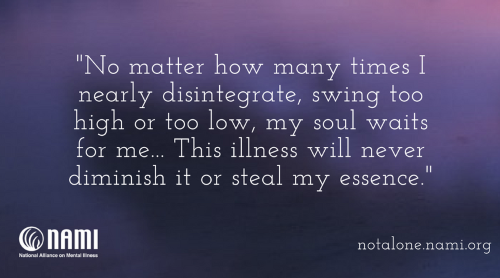November 07, 2017
By Maureen Goldman

I woke up this morning to a night sky and headed for my rocking chair on the porch. Stars and a sliver of the moon were still shining. Looking up, I wondered why we readily make wishes upon stars and struggle to believe in ourselves. We are here in the flesh with all kinds of talents and dreams.
Why indeed. By the time you are in your 50s, chances are you’ve had plenty of opportunities to lose faith. For some of us, our failures and transgressions become tattoos. The things you are good at, the things you really love to do, become an addendum to your life story.
I have a cousin who lives with bipolar disorder. The disease has derailed him several times. After each episode, he brings himself down a notch. Listening to him talk about how he wants to be a better person breaks my heart. He is so good already—smart and thoughtful and handsome and athletic, but he doesn’t see it.
I have bipolar disorder too. I heard myself in his regrets and sadness. With this illness, you can do some really gnarly things when you are manic. My specialty is saying exactly what’s on my mind when I lose my temper. In a manic outburst, I can deliver a message with stunning clarity and laser precision. My words are a shot to the center of the heart. I’ve lost friends. I’ve worked extremely hard on this, and it rarely happens now. Nevertheless, I have a history.
When you swing low, to the bottom of an episode of depression, you can’t see or feel past the moment. Your mind won’t let you embrace good thoughts. That has its consequences too. The feeling of hopelessness is everywhere, and you are tired all the time. Processing a rational thought is like walking through hot tar. When I listen to my cousin, I can’t believe that someone as capable as he is feels so bad about himself, but I get it. I can count on more than ten fingers the times I feel just like him.
People with bipolar disorder have to pick themselves up again and again. Sometimes you start from scratch. You have to be willing and invested in mining your goodness and finding faith over and over. It is no surprise to me that this disease has the highest rate of suicide among people with mental illnesses. When I tell people I have bipolar disorder, I act all nonchalant about it. Some people are shocked, not because I am mentally ill, but because I don’t “show signs.” That’s because I take my medication like I brush my teeth, every day and with devotion. That’s because I can afford to see a psychiatrist.
Most of all, my family is extremely supportive. My husband and children are compassionate and patient. On the days I rest, my daughter Emma comes upstairs to check on me. The empathy and acceptance she radiates feels like a double scoop of love. My husband is by my side always. And my son, he can feel what I’m feeling sometimes. In those moments, when he offers kind words they are like anchors.
Being bipolar is one of the reasons I try to be positive. I’ve dusted myself off many times. I know failure really well. No matter how many times I nearly disintegrate, swing too high or too low, my soul waits for me. It is whole and healthy, and it is a tremendous friend. This illness will never diminish it or steal my essence. You have no idea how grateful I am.
We’re always accepting submissions to the NAMI Blog! We feature the latest research, stories of recovery, ways to end stigma and strategies for living well with mental illness. Most importantly: We feature your voices.
LEARN MORENAMI HelpLine is available M-F, 10 a.m. – 10 p.m. ET. Call 800-950-6264,
text “NAMI” to 62640, or chat online. In a crisis, call or text 988 (24/7).